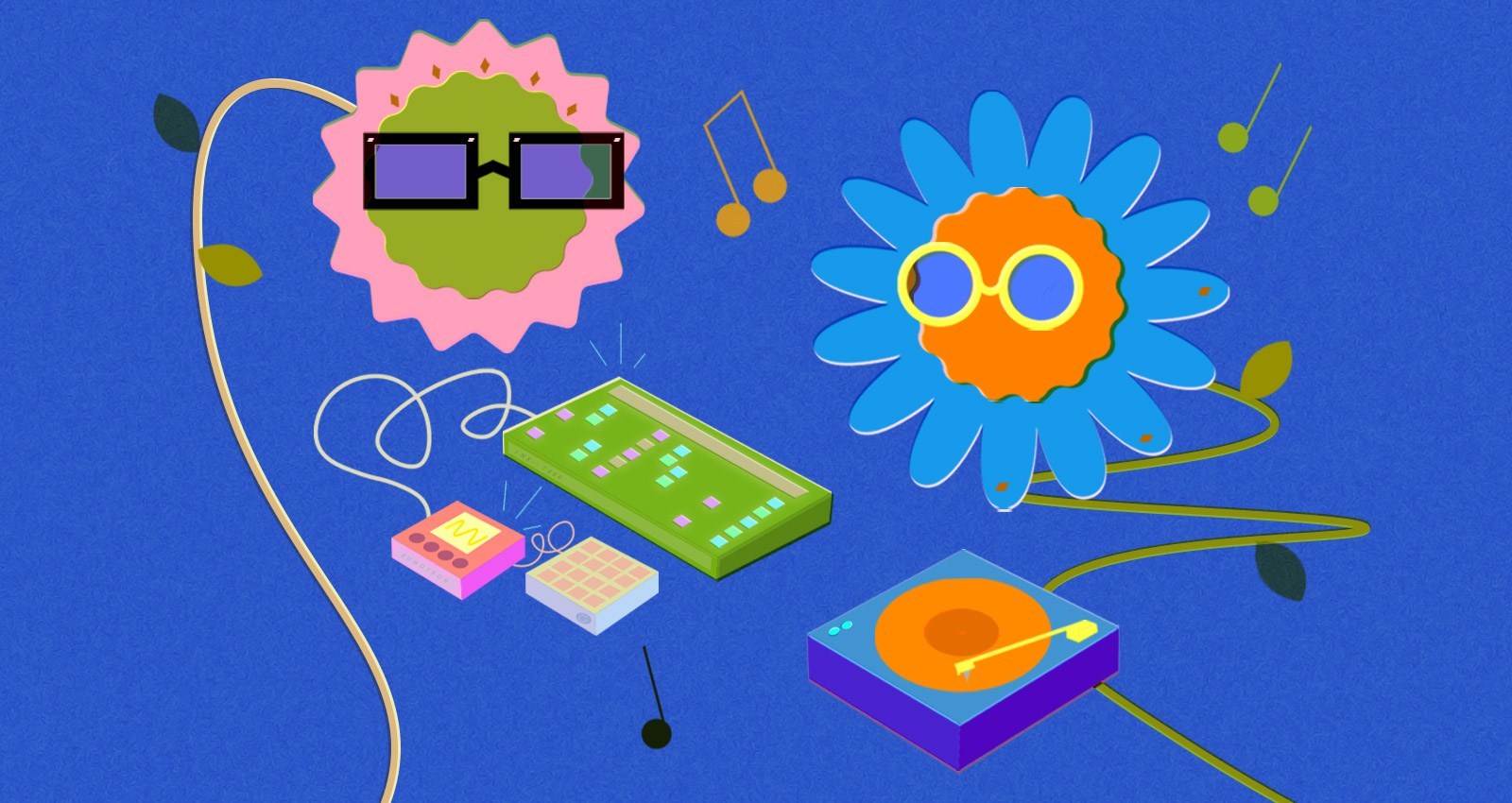Bands Are Struggling, Bandcamp’s Fee-Free Friday Is Here To Help
Posted: by admin

Illustration by Emma Shore
Every industry around the world has been impacted by the COVID-19 pandemic; music is, sadly, no exception. Tours and shows have been postponed into the fall or outright canceled, leaving musicians scrambling to make ends meet with that revenue stream eliminated completely. Perhaps the most anxiety-inducing reality is that, as the pandemic’s impact seems to broaden each day, we have no idea what life will look like in three, six, or even nine months. As cities around the world adopt stringent social distancing practices, if not complete lock downs, the prospect of live music returning anytime soon feels like, as Free Throw would say, chasing our pipe dreams with shots and a whole lot of beer. At the risk of sounding bleak, that could be a death knell for indie musicians who depend on touring revenue to survive.
Now, bands are humbly at the mercy of their fans; to survive these coming months, they’ll need to rely on the only sources of income available to them: selling records and merch online and digital music sales. The fractions of a cent they earn from streaming just aren’t going to see them through this hellscape we now live in.
Take, for instance, Michigan’s Dogleg, who just poured a ton of money into producing their first full-length album, Melee, for its March 13 release. To capitalize on the hype (and there has been hype), on March 20 they were set to embark on a 13-date U.S. tour supporting Microwave, along with Elder Brother and Save Face. That tour has been postponed. “Buying our music is essentially the highest form of flattery for us and we’re incredibly grateful people would want to spend their money on the music we wrote,” says Chase Macinski, Dogleg bassist. “It would really help us get back on our feet after investing in costly gear fixes, car maintenance, and merch orders for the upcoming tour we had cancelled and hit the ground running when we can.”
On Friday, Bandcamp is trying to help give artists a little breathing room. A thriving indie-music marketplace, Bandcamp is notable in that it allows fans to ethically and directly support their favorite musicians. Typically, Bandcamp takes a revenue share on sales: 15 percent on digital items and 10 percent on physical goods. After processing fees, usually an additional 4 to 7 percent per sale, the remaining 80 to 85 percent goes directly to the artist, paid out daily. In all, fans have paid artists and independent labels $469 million through Bandcamp. On March 20, however, Bandcamp is waiving its revenue share from midnight to midnight PST; the money will go straight into artists’ pockets.
“For many artists, a single day of boosted sales can mean the difference between being able to pay rent or not,” says Bandcamp co-founder and CEO Ethan Diamond. “It may sound simple, but the best way to help artists is with your direct financial support, and we hope you’ll join us on Friday and through the coming months as we work to support artists in this challenging time.”
The shockwaves have been felt throughout the industry, by record store owners and staff, tour managers, event producers, venue staff, lighting and sound professionals, janitors, photographers, bartenders, security guards, PR professionals, artists who design tour posters and merch, and more. “We’ve been seeing our bands’ tours being postponed or canceled almost every day now since this all got really bad,” says Natalie Schaffer of Big Picture Media, a New York City PR agency repping lots of indie and DIY musicians. “It’s been heartbreaking and we know this is how a lot of our bands make revenue that sustains them throughout the year. It’s that money that funds their life and helps them to keep recording, keep touring. If you’ve got the means, please purchase from a band you love today. A little goes a long way. We have to keep music going, especially now.”
The busy spring into summer touring and festival season was beginning in earnest when COVID-19, with more than 207,000 cases worldwide per WHO, ground everything to a halt. Bands had just finished producing huge merch orders to take out on the road. Now, much of that merch is sitting in boxes in bedrooms and garages. “Our tour, for instance, got canceled pretty early on, and it’s a bummer not just in that we won’t get to make friends and play shows in new places, but also in that we now have a bunch of merch and no marketplace for it,” says Sam Treber, vocalist in Pittsburgh’s Short Fictions. “We have only just recently gotten to the point as a band where we might have a little bit of money in the band fund before hitting the road, whereas in the past we often would leave Pittsburgh with a negative balance, and I’m sure the latter is the case for many of our peers. Oftentimes bands, us included, will sink a formidable amount of money into merch for a tour, being that it’s the most reliable method of making money on the road, and it’s scary in this situation for most people to have just the merch, and the debt, but no tour.”
Faced with the cancellations of their tours, many bands have taken on the task of selling their tour merch direct to fans. Indie label out of Massachusetts Take This to Heart Records is waiving the cut it would have taken on merch it sent its bands for tours that are now canceled. “We sent over hundreds of items to bands for these tours, and with these cancellations it sucks for everyone,” says Joe Urban, Take This to Heart Records owner/label manager. “We are basically getting bands to put up items and have fans directly pay them for all the tour items we bought. We price out albums and merch super cheap to bands for tour so they can make money at every show they play.”
Some bands are rising to the challenge, finding creative and tongue-in-cheek ways to unload their tour merch. But for other bands, pivoting to running ecommerce sites is just too taxing or too expensive right now, and letting Bandcamp handle their merch and vinyl sales is a welcome reprieve. New Jersey’s Save Face put all their tour merch up on their site, marked down 50 percent, and saw everything but a long-sleeve T-shirt sell out in two hours.
Short Fictions had a little fun with their own misfortune. “When we found ourselves in this situation a few weeks ago we came up with the idea to make a crazy-car-salesman-super-liquidation-sale type video as an advertisement for all the merch that we were sitting on, and thankful it really worked out for us,” Treber says. Enter CRAZY RYAN’S CRAZY MERCH BLOWOUT! This merch didn’t fall off a truck, “Crazy Ryan” exclaims in the video. Our tour got fucking canceled!
we’re fucked pic.twitter.com/Hfr6qfOcpq
— Short Fictions (@short_fictions) March 17, 2020
“The video kinda blew up on the internet and we made more online sales than we ever have before for a single day. It was really heartwarming,” says Treber. All those sales went through Short Fictions’ Bandcamp. “I really appreciate them as a website,” Treber adds. “I think they could probably afford to extend the time frame on this promotion, or, y’know, increase revenue share to artists in general, but I still appreciate them.”
Even if artists aren’t sitting on piles of unsold merch, there are other ways they can bring in some revenue during this time. Diamond suggests artists dig up their live recordings and early demos release them. Some artists are offering music production services, video hangouts, lessons, or gear tutorials, all of which can be listed as merch items on Bandcamp. Zoe Reynolds of Kississippi says she’s putting up preorders for Kississippi candles. Artists can also sell subscriptions, in which fans pay a monthly or annual rate and receive all the band’s new music as well as other goodies like subscriber-only tracks or b-sides and signed or limited edition items.
Bands especially appreciate the support because they know how hard it is for everyone right now, not just musicians. “I wouldn’t expect anyone to be able to pay for anything right now. With almost the entire band recently out of work because of everything, we get it,” says William White, drummer of Los Angeles’ glass beach. “Over the last week we have seen so many artists and industry professionals rise to the occasion, giving people a reason to stay engaged and do their part to help people find solace outside of the news and world around them,” says Anthony Gesa, guitarist in New Jersey’s Gatherers. “Companies like Bandcamp are keeping artists afloat and still bring in revenue a lot of them have lost due to tours being cancelled across the globe. Anything and everything helps.”
“Buying our merch or music during this time could genuinely be what keeps us afloat, and if you can without compromising your own finances, it would be incredible to get that support right now. We’d cry for sure. Definitely. No question.”“People supporting touring bands and bands affected by the virus are why bands love what they do,” says Andy Schueneman, frontman of Florida’s Worst Party Ever. “We’re in a situation where we should look out for each other in this community now more than ever. All of us, including our band, are being hurt by this, but art and music will continue to live on and thrive regardless of the hardships we’re facing as a community.” It can make even the grinchiest among us a little weepy to see the solidarity musicians have shown for one another, even as they suffer their own losses.
“I mean, I’d love to have people buy our stuff [on Bandcamp], but I’d rather them buy it from bands that really need it right now,” says Casey Crawford of Florida’s Virginity, noting that his band didn’t just produce a huge merch order or cancel a tour. Says bassist Randy Reddell of Florida’s Dikembe, “We don’t rely on Dikembe as a source of income, so we would very much encourage people to support small DIY hardworking bands like Zeta, who had months long tours cancelled after buying thousands of dollars in merch and are struggling to pay their bills.”
“Buying merch or music directly from your favorite bands is one of the easiest and best ways to support them,” says vocalist Zech Pluister of Chicago’s Sleep On It. “With streaming and other forms, they don’t see a whole lot of that revenue, but merch and buying music off of sites like Bandcamp we see a lot more of that, in turn helping us way more directly. The support of all of the fans means the absolute world to every artist, especially in trying times like this.”
The Bandcamp profile of every musician mentioned in this piece has been linked throughout. Whether it’s a pin, a sticker, a record, a candle, a shirt, or all of the above, buying something from an artist’s Bandcamp today is the most direct way you can support them, short of sending them money through Venmo or CashApp. (If you can, do that, too!) You can also leave a tip and a personal note to the artist on your Bandcamp purchase, which is appreciated now perhaps more than ever before. “We’ve already had a handful of people donate to us directly and we’re always absolutely touched by that,” says Treber. “I also pray that Spotify notices the value in this kind of thing and follows suit,” he adds, “but I’m not holding my breath.”
_
Michelle Bruton // @MichelleBruton
The Alternative is ad-free and 100% supported by our readers. If you’d like to help us produce more content and promote more great new music, please consider donating to our Patreon page, which also allows you to receive sweet perks like free albums and The Alternative merch.










